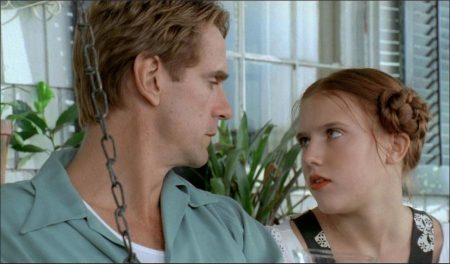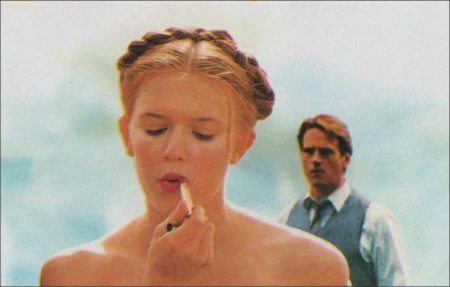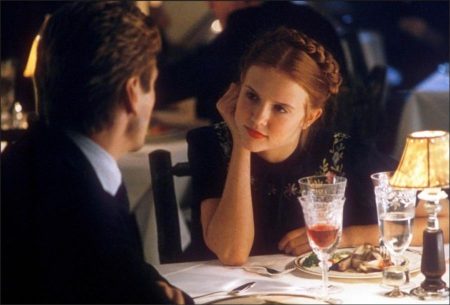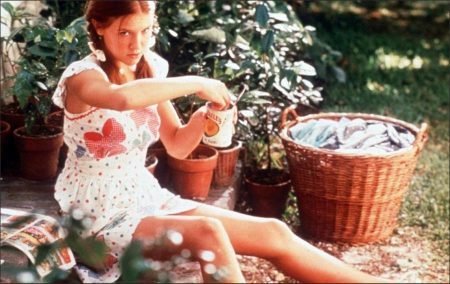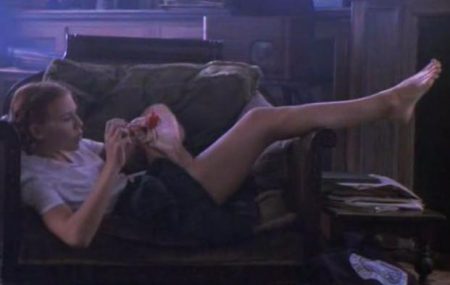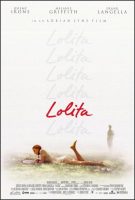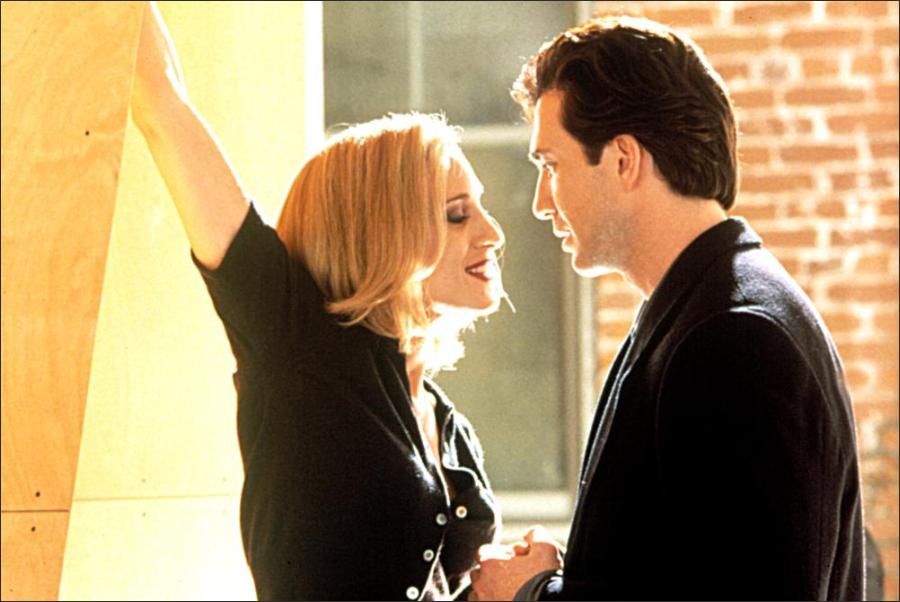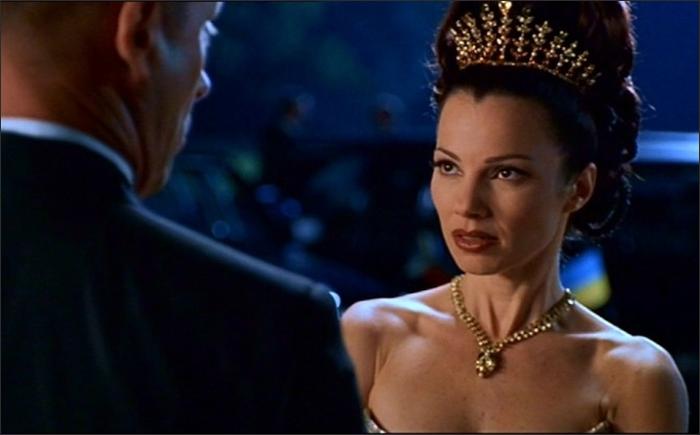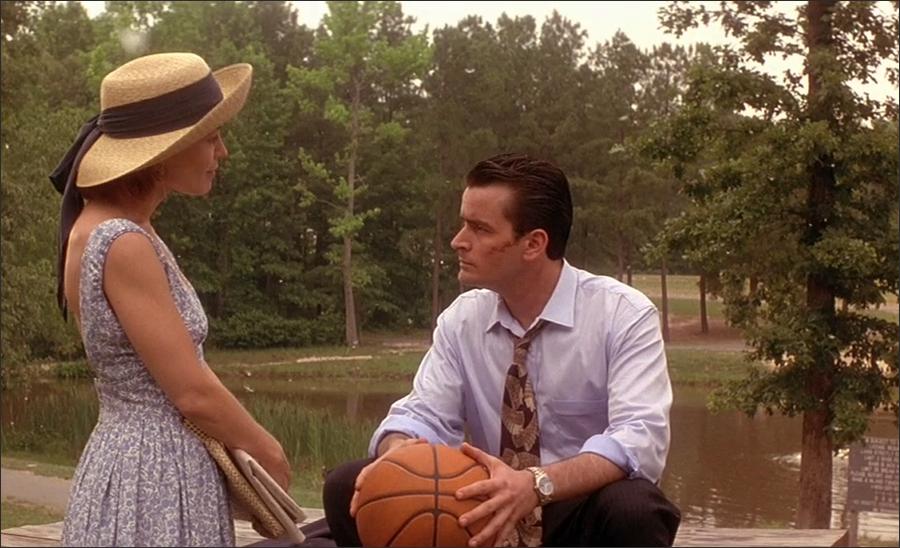Lolita Movie Trailer. Adrian Lyne (director of Fatal Attraction, 9 ½ weeks, and Indecent Proposal) is no stranger to movies that have a plot with a perverse sexual content. His 1997 screen adaptation of Lolita does the book justice; although certain artistic interpretations throughout the film may not have been what Nabokov had in mind when he wrote his novel.
I personally believe this movie is a closer adaptation of Nabokov’s novel than the Kubrick’s 1962 version (even though Nabokov helped write the screen play). Lynn gives us a presentation that is very sympathetic to Humbert Humbert. Nabokov’s Humbert was extremely complex character and in this adaptation, Humbert Humbert is shown as part a victim of his fixation on young girls; part sexual predator; and part a hopeless romantic. Lynn’s presentation transforms Humbert from the seducer into the seduced, whose weakness for young girls is manipulated by a sexually precocious siren tempting him to dash himself on the shoals of pedophilia.
Lynn also portrays Lolita as the sexual aggressor, an adolescent temptress who knows she is desired and simultaneously teases and entices Humbert to do her lustful bidding, knowing he is powerless to resist her. Lynn’s Humbert is more of a hapless romantic than a fiend, ennobling him as a victim of love rather than the confounded sociopath he really is. In Lynn’s version, Humbert becomes the fly to Lolita’s spider. Lolita entered into the sexual relationship more as a result of her personal longings burgeoning from her blossoming sexuality than a desire to seduce Humbert in particular, who was not even her first lover.
However, after the initial seduction scene when they take to the road, the film is very true to the book in chronicling the decay of the relationship. Humbert plunges into feelings of romantic desperation with Lolita’s shrewish exploitation of him as she increasingly uses sex and her sexuality as a weapon. The book was very effective at portraying the relationship as a symbiosis of two deficient beings, each selfishly taking from the other what was needed.
Lynn does an excellent job of portraying that throughout his film. As the relationship degenerates, Lynn is effectual at portraying the ugly side of both characters. The bitterness and rancor that results is compelling. To his credit, he understands that Nabokov’s story was more of a character study than a sex story and Lynn avoids the temptation of becoming too lurid, focusing instead on solid character development of two very flawed people.
This movie also does a great job of showing 1940’s America. The costumes, hairstyles, cars, furniture, locations create a forties reality that is amazing. The music in particular is not just perfect for the period, but it is integrated with the storyline. As Humbert and Lolita travel, the music changes to reflect the region. Plus having Lolita dance and sing along with the music on the radio is a nice touch because that is exactly what teenage girls of any era do. The colors used in the movie are just amazing. They actually seem to follow the mood of the story, from excitingly colorful to tragically dark.
Dominique Swain delivers as Lolita, she is the perfect film nymphet: young and innocent, but vulgar and crude at the same time. Though Lynn’s early interpretation of Lolita as the teenage temptress is very controversial, I can’t imagine it being done any better. She is playful and provocative in a childlike manner, part pixie and part vamp. Once they get on the road, Swain’s performance is almost a force of nature. She is powerful and intense, effortlessly moving back and forth between sweet innocence and the emotional torrent typified by the murder me scene. It is an outstanding performance with depth and breadth that is very unusual for an actor so young.
Jeremy Irons is wonderful as Humbert Humbert, giving him an amiable personality. Irons injects a good deal of wry humor into the part in addition to giving Humbert an almost quixotic romantic quality. Jeremy Irons is able to take a character who is naturally repellent as Humbert and show the viewer the depth of this character, which is seen both in his sincerity to real life and his truth in Nabokov’s writing. Irons delivers probably one of his best performances as he portrays the tragic character of Humbert Humbert. Iron’s voice-over also helps viewers get into the mind of Humbert and understand his thoughts and actions.
Melanie Griffith is cast as Charlotte Haze. She looks nothing like the portly and plain character described in Nabokov’s book. Though her acting is fine and she is appropriately obsequious, she is far too attractive to be the repulsive troll Humbert despised. It takes away from Humbert’s desperation because it hardly seems like a great sacrifice to have married Charlotte to be near Lolita.
Frank Langella plays the mysterious playwright Clare Quilty, making the audience want to sympathize with Humbert when he pulls the trigger as he confronts Quilty with the revolver. He treads the line between creepy and comedic perfectly. A flashback sequence in the beginning of the movie portrays a fourteen-year-old Humbert’s doomed summer romance to his first love Annabel, which sets up Humbert as a brokenhearted romantic trapped in the past. Thus, when he sees Lolita for the first time, lying out in the grass of the piazza, innocently letting the water from the sprinkler drench her, the reincarnation of that love is clear. That clarity, however, transcends the simple addition of the flashback. Irons’ startling licentious stare at Lolita is blatant and raw for the viewer to see.
In those eyes the viewer sees tenderness with wickedness, occupation without realization, a moment of pure lust. The amorous connection is developed in that one look, Irons not only sees beauty but he perversely sees a sexual creature, correctly identifying the perplexing issue for the reader and viewer of Lolita. While his love is based on pedophilia, is there something in his love for Lolita that is common to all love? His intoxication is precisely what makes the story of Lolita so fascinating. Humbert’s love for Lolita is as real as anyone’s love for another, and the perverse thing is that he truly madly deeply loves a child.
From the first meeting between Humbert and Lolita on, Irons is true to the version of Humbert Humbert that Lynn and Stephen Schiff prescribe. The viewer sees rare moments of ease between Humbert and Lolita; the two of them exchanging stories as they swing on the porch; the rapt, nearly bashful smile he gives her while she sits in his lap showing him how she can make her chin wiggle. Irons as Humbert is heartbreaking: he is tortured and helpless in his obsession with Lolita. Despite scenes when Humbert is buying sexual favors from Lolita with a jars full of coins; despite his heavy authority over her activities, Irons never let’s the viewer lose sight of his complete and utter dependence on Lolita.
Although Lynn and Schiff’s version seems void of the cunning that is so very much a part of the literary Humbert, the essential question is the same: Who was in control of the situation? Lolita or Humbert? Who is more to blame for the affair? Through possibility of empathizing with Humbert’s love for Lolita, the viewer is left with an unnerving understanding of his pedophilia. Irons makes it almost impossible to completely detach our knowledge of what love is from the perverse love between Humbert and Lolita.
Being true to a character, as in being true to a book, means that an actor catches the essence from the book, not necessarily the exact phrasing or the exact chronology of events. Irons catches Humbert Humbert’s tenderness and the true infatuation that is so evident in his confessions.
In the Kubrick version from 1962, Lolita is sixteen; in this version she is fourteen but in the novel, she is twelve. The difference between twelve and fourteen is enormous. The point is that this literary masterpiece simply needs to be read to be appreciated; if a faithful rendition of the novel is to be made it would be kiddie porn. It would also have to be ten or twelve hours long. And really, the sickness of Humbert, of his blighted lust and love for small girls, isn’t even what the book is about.
In my favorite scene, where Quilty (Langella) uses word-play to terrorize Humbert, the zapping of the insect killer, the purple sparks, the tone of Quilty’s voice, his expressions, Sleep is a rose, the Persians say are pure Nabokov, and this scene is superb. The other Lolita scene that is shown in the film is Humbert’s murder of Quilty: Quilty eats cigarettes and spouts literary nonsense; then a piano covered with blood keeps playing on. Another highlight of the movie is definitely the last scene in which Humbert surrenders to the police: Humbert stands on the top of a hill and listens to the voice of children playing and expresses his remorse for ruining Lolita’s childhood.
I can’t say that this version of Lolita is better, they each contain what the other lacked. Kubrick’s version contains the humor that Lynn’s version is lacking while Lynn’s version contains the sadness that Kubrick missed. Including reading Lolita, I would recommend that the viewer get both films. Lolita is both a satire and a sad story rolled into one. The two films in a way compliment each other.
Lolita (1997)
Directed by: Adrian Lyne
Starring: Jeremy Irons, Dominique Swain, Melanie Griffith, Frank Langella, Suzanne Shepherd, Keith Reddin, Pat Pierre Perkins, Angela Paton, Emma Griffiths Malin
Screenplay by: Stephen Schiff
Production Design by:
Cinematography by: Howard Atherton
Film Editing by: David Brenner, Julie Monroe
Costume Design by:
Set Decoration by:
Art Direction by:
Music by: Ennio Morricone
MPAA Rating: R for aberrant sexuality, a strong scene of violence, nudity and some language.
Distributed by: The Samuel Goldwyn Company
Release Date: September 25, 1997 (United States), January 14, 1998 (France)
Hits: 3186
